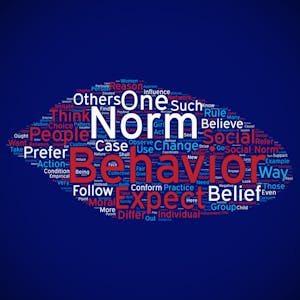Social Norms, Social Change I
This is a course on social norms, the rules that glue societies together. It teaches how to diagnose social norms, and how to distinguish them from other social constructs, like customs or conventions. These distinctions are crucial for effective policy interventions aimed to create new, beneficial norms or eliminate harmful ones. The course teaches how to measure social norms and the expectations that support them, and how to decide whether they cause specific behaviors. The course is a joint Penn-UNICEF project, and it includes many examples of norms that sustain behaviors like child marriage, gender violence and sanitation practices. This is Part 1 of the Social Norms, Social Change series. In these lectures, I introduce all the basic concepts and definitions, such as social expectations and conditional preferences, that help us distinguish between different types of social practices like customs, descriptive norms and social norms. Expectations and preferences can be measured, and these lectures explain how to measure them. Measurement is crucial to understanding the nature of the practice you are facing, as well as whether an intervention was or was not successful, and why. In Part 2, we will put into practice all we have learned in Part 1.
New! Please use this link for a 30% discount on the recommended book that accompanies this course!
https://global.oup.com/academic/product/9780190622053/?cc=us&lang=en&promocode=AAFLYG6
None
Syllabus
Syllabus - What you will learn from this course
Week 1
Interdependent & Independent Actions + Empirical Expectations
Week 2
Normative Expectations + Personal Normative Beliefs
Week 3
Conditional Preferences + Social Norms
Week 4
Pluralistic Ignorance + Measuring Norms
FAQ
When will I have access to the lectures and assignments?
Access to lectures and assignments depends on your type of enrollment. If you take a course in audit mode, you will be able to see most course materials for free. To access graded assignments and to earn a Certificate, you will need to purchase the Certificate experience, during or after your audit. If you don't see the audit option:
What will I get if I purchase the Certificate?
When you purchase a Certificate you get access to all course materials, including graded assignments. Upon completing the course, your electronic Certificate will be added to your Accomplishments page - from there, you can print your Certificate or add it to your LinkedIn profile. If you only want to read and view the course content, you can audit the course for free.
Is financial aid available?
Yes. In select learning programs, you can apply for financial aid or a scholarship if you can’t afford the enrollment fee. If fin aid or scholarship is available for your learning program selection, you’ll find a link to apply on the description page.
Reviews
Achei o curso muito interessante e importante para entender a minha area de trabalho com certeza abso;uta irei implementar os conhecimentos adquiridos e estou pronta para entrar na 2 parte do curso
This course is both informative and practical! It manages to convey the complexity of social norm analysis and measurement while remaining accessible to students with no prior knowledge.
I really enjoyed the course. It absolutely made me reconsider how I approach a problem. Understanding the reason why people think the way they do is essential in driving positive change.
Firstly thank you to UNICEF and Pennsylvania University for this opportunity . This course for really helpful to knowledge in Social environment and teach in practically about Behavior.
